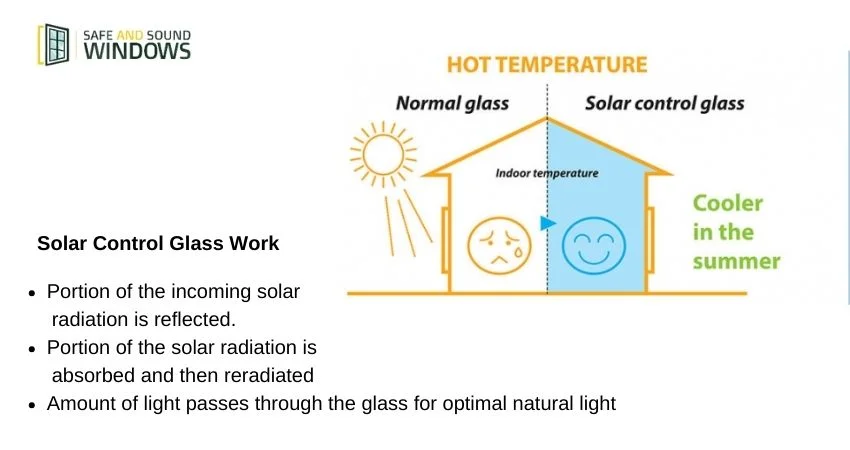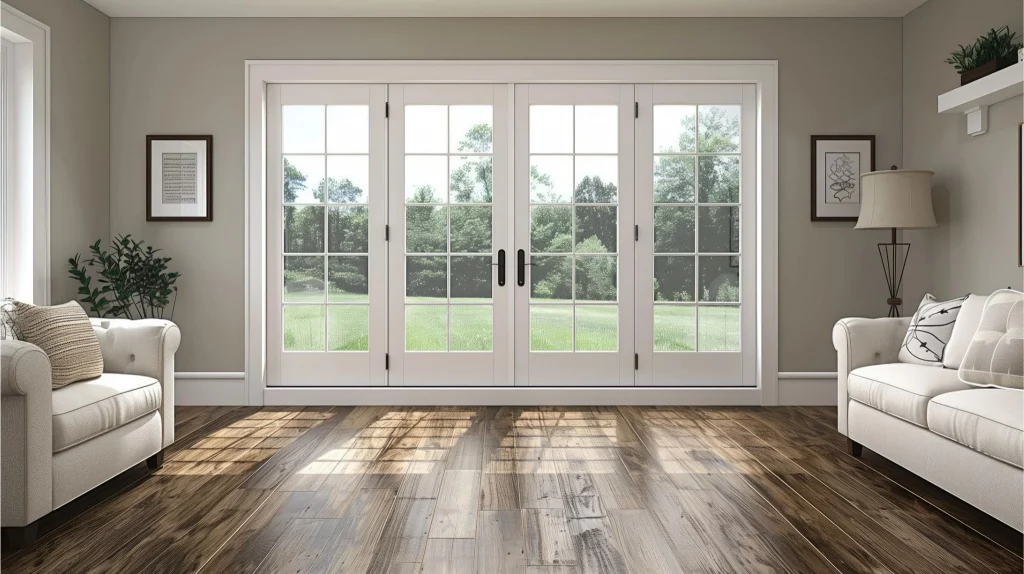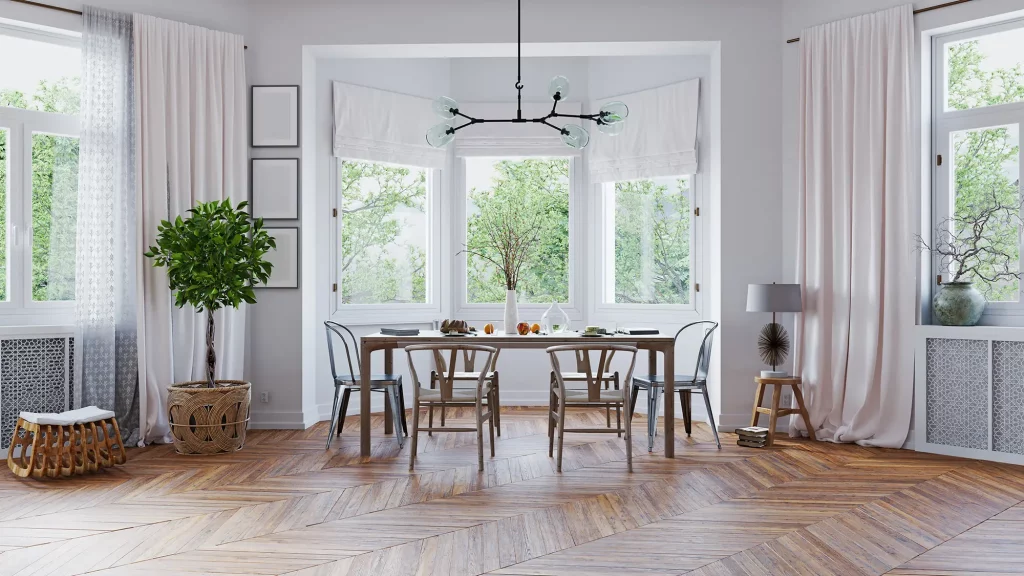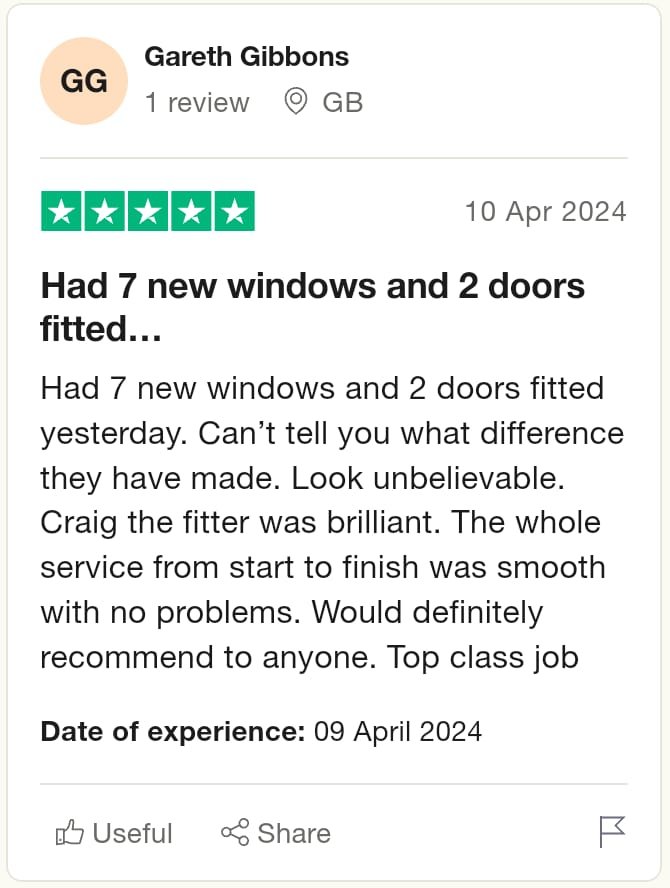Solar Control Glass
Read about what is Solar Control Glass and the benefits when used in a window.
Solar control glass is a specialized type of glazing that incorporates a thin, transparent coating designed to selectively reflect, absorb, and transmit solar energy.
This coating acts as a barrier, regulating the amount of heat and light that passes through the glass, while still allowing for natural illumination and visibility.
The mechanism behind solar reflective glass lies in its ability to manipulate the solar spectrum.
The coating is engineered to reflect a significant portion of the infrared radiation, which carries the majority of the sun’s heat, while transmitting the visible light spectrum, ensuring optimal daylighting and minimizing excessive heat gain.
What Is Solar Control Glass?
Solar glass, also known as solar control glass, is ordinary glass with a metallic coating applied specifically to reflect infrared light while letting ultraviolet light through.
As a result, the glass is able to let in as much light as possible while still absorbing solar heat.
Using sun control glass is primarily recommended for energy-efficient homes in order to prevent overheating and the need for mechanical cooling. In order to create a more comfortable living space, solar control is also beneficial.
We offer safety glass for all of our windows
Keep your loved ones and pets safe with safety glass in your doors and windows.
Applications of Solar Control Glass

Residential Applications
- Windows: heat reflective glass is an excellent choice for windows, particularly those facing south or west, where excessive heat gain can be a concern. By regulating the amount of solar heat entering the home, it helps maintain a comfortable indoor temperature and reduces the need for air conditioning.
- Skylights and Roof Glazing: Overhead glazing, such as skylights and roof glazing, can be a significant source of solar heat gain. Heat control glass mitigates this issue, allowing natural light to illuminate interior spaces while minimizing the risk of overheating.
- Conservatories and Sunrooms: These glass-enclosed spaces are particularly susceptible to excessive heat buildup. Solar control glass ensures that these areas remain comfortable and enjoyable, even during the warmest months.
Commercial Applications
- Curtain Walls and Facades: In commercial buildings, curtain walls and facades often feature large expanses of glazing. Solar control glass helps regulate the indoor temperature, reducing the strain on HVAC systems and contributing to energy savings.
- Atria and Skylights: Similar to residential applications, heat reflective glass is ideal for atria and skylights in commercial buildings, providing natural illumination while controlling solar heat gain.
- Retail Spaces and Showrooms: Large glazed areas in retail spaces and showrooms can be prone to excessive heat and glare, compromising the comfort of customers and employees. Solar reflective glass offers a solution by creating a comfortable and visually appealing environment.
Explore Window Glazing
The Benefits of Solar Control Glass: Comfort, Energy Savings
Incorporating heat reflective glass into building designs offers a multitude of benefits that extend beyond mere aesthetic appeal.
These advantages encompass improved thermal comfort, significant energy savings, and a commitment to environmental stewardship.
Thermal Comfort and Reduced Cooling Loads
One of the primary advantages of solar reflective glass is its ability to mitigate excessive heat gain, thereby minimizing the need for mechanical cooling systems.
By reflecting a substantial portion of the sun’s infrared radiation, solar control glass helps maintain a comfortable indoor temperature, reducing the reliance on energy-intensive air conditioning units.
Energy Efficiency and Cost Savings
The energy-saving potential of solar glass is substantial. By minimizing the solar heat gain, the cooling load on the building is significantly reduced, leading to lower energy consumption and cost savings.
This not only benefits the environment by reducing greenhouse gas emissions but also translates into tangible financial savings for building owners and occupants.
Glare Reduction and Visual Comfort
Excessive glare from direct sunlight can cause discomfort and strain for building occupants, particularly in spaces with large expanses of glazing.
Solar glass effectively mitigates glare by selectively reflecting a portion of the incoming sunlight, creating a more comfortable and productive environment for occupants.
Different Glass Types for Different Needs
View the safe and sound range of specialist glass and glazed units.
Where Should I Use Solar Glass?
sun control glass is advised for windows facing south and southwest and other locations where sun gain may be a summertime concern.
Conservatories and skylights can also utilize solar control glass to lessen solar gain from direct sunshine.
You may achieve a balance of climate control in the summer and winter by combining low-e and sun control glass in one unit.
Safe and Sound Windows Ultimate Triple Glazing balances a G-value of 0.19 and a market-leading U-value of 0.80 with sun control glass and low-e glass.
Here are some frequently asked questions
Solar control glass incorporates a specialized coating designed to selectively reflect and absorb solar energy, while tinted glass relies on a colored or tinted substrate that absorbs a portion of the visible light spectrum. Solar control glass offers superior performance in terms of solar control and energy efficiency.
Yes, solar control glass can be combined with other types of glass, such as low-emissivity (low-E) glass or laminated glass, to enhance overall performance and provide additional features like thermal insulation or safety.
Conversely, heat-strengthened glass breaks in a more controlled way but needs to be laminated to be considered safety glass, as it does not break into small pieces.
While solar control glass typically carries a higher initial cost compared to regular glass, the long-term energy savings and reduced cooling loads often offset the upfront investment, resulting in a lower overall cost of ownership.
Yes, solar control glass can be retrofitted to existing buildings as part of a window replacement or glazing upgrade project. This can significantly improve the energy efficiency and thermal comfort of older structures.
The color or tint of solar control glass can influence its performance to some degree. Generally, darker tints or reflective coatings provide higher levels of solar control but may reduce visible light transmission. Manufacturers offer a range of options to balance solar control and daylighting based on specific project requirements.
Yes, solar control glass can be beneficial in cold climates when combined with low-emissivity (low-E) coatings. This combination helps regulate solar heat gain during warmer months while retaining indoor heat during the colder seasons, improving overall energy efficiency.
We Can Help You Choose the Right Glass for Your Home
Book your free quotation appointment with one of our local consultants who will discuss your requirements, show you samples and provide you with a free no-obligation quote.
















